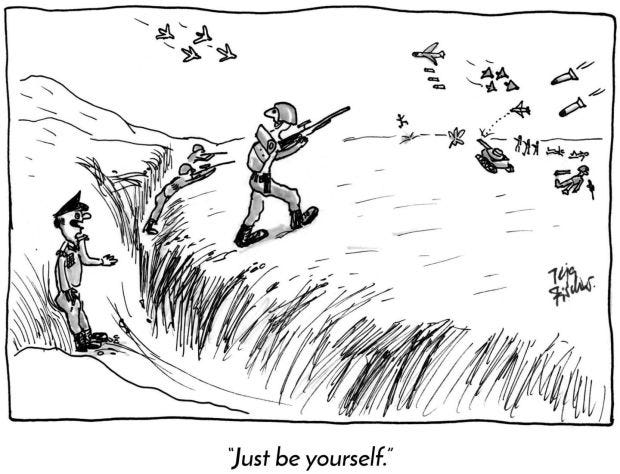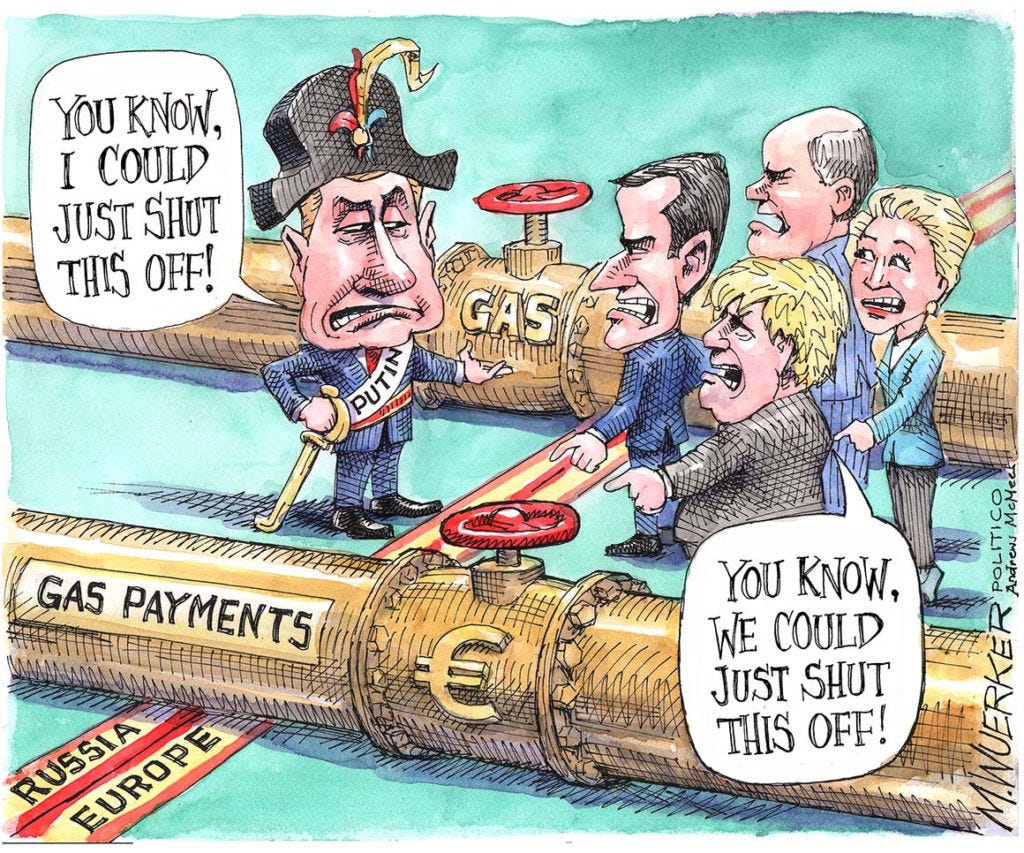Ukraine 2: The New Era Arrives
analyzing the invasion of Ukraine of a geopolitical perspective, and taking a critical look at American/Western foreign policy decisions that have landed us in this impossible position.
This is an ongoing series. Last time, I wrote generally about how common Americans reacted to the invasion, so this time I’m going to the opposite side of the scale to analyze the reactions of larger geopolitical players in the world. How do larger geopolitical happenings effect normal people in the West? Is the nature of our world order crumbling faster than before?
Social media painted with the Ukrainian flag has officially hit a saturation point—the signal that the internet might be dangerously close to moving-on. This cannot happen if we are to make anything of this catastrophe for societal growth.
I’m going to explore a few points-of-view here, talking about a lot of reactions from the global elite as well as speculating on what it all might mean—we are talking here about the ongoing cultivation of the neoliberal global capitalist global order.
The context of changing global orders has everyone’s anxiety peaking. The double talk of the political establishment has ballooned in the Western world. As Ukrainians line up behind Parisian-style barricades, multiple interests are stepping-up to line their pockets.
Marketers, the scum of the Earth, have fully exploited the situation; Ukrainian flags for sale outside European arenas, as well as myriad other merch finding it’s way into Westerner’s hands. If you can’t fight the war, you can buy a shirt that says, “I survived the Russian invasion of Ukraine!”, on Redbubble.
The optics around world leaders passing the ball amongst one another on Ukraine’s future is bad for business. Similar indecision has gripped European leaders historically, but that world order is mostly gone. We find ourselves not quite sure what to do when the order is challenged—the benefits of democracy are limited, and the urge to defend it getting weaker with every disaster. Still, it’s what we have.
"Russia today is not returning to the Cold War with a series of clear rules... something crazier is happening. Not a cold war, but a warm peace."
- Slavoj Zizek speaking at Levica Congress in Slovenia
Again, the desires of old men have put the global community at-risk. The economic salvos, fired with surprising unison by the Western world, have damaged the Russian nation’s ability to buy the Big Mac.
Despite these tough losses, Putin has refused to back down. Some speculate that his regime’s continuity might depend on territorial gains, but that could just be NATO propaganda. What perception we have of the Russian state apparatus has only revealed a serious communication breakdown amongst different state organs.
There are reports that the Russian military, lacking a central military commander, has multiple forces competing for supplies between all the subsequent invasion operations being run. They’ve been made fools, running out of gas and leaving their vehicles only to be picked-up for repurposing by the Ukrainians.
The response from European heads of state have been generally supportive of Ukraine. The elephant in the room seems to be that no government is willing to lose troops fighting Russia unless directly provoked, no matter how many Ukrainians die. Putin knows this, and is hoping to pin the West into this position until he accomplishes his goals, whatever they might be. NATO has offered the next best thing, sending weapons and ammo.
At the head of this support leviathan is the United States, which has led the assault on Russia’s economy. Biden, who is truly desperate to prove his foreign policy can make up for all his other shortcomings, seems to have had mixed success.
The ruble is in free-fall, and rich Russians are surely worried their oligarchic gains might be taken from them if the Russian people rise-up. This is wishful-thinking however, and the energy issue has driven a wedge into NATO unity. The large spear, cutting off Russian gas from world markets, has largely missed.
The tardiness of Western leaders in realizing green energy solutions has totally hamstrung these nations, leading them to directly fund the invasion of Ukraine.
Pro-NATO propaganda has flooded all communication mediums, and older Americans are comfy to settle back into Cold-War sentiments against all things Russian. This response is flat stupid, but it makes sense given how many people have been programmed as-such.
The U.S. hopes to turn Ukraine into Russia’s Iraq—yes, I do take psychological damage from how morally bankrupt their intentions are. But their goal is to squeeze Putin/Russia so hard that the weight of the global capitalist order forces the yielding of hostilities.
Biden’s domestic program is deadlocked in the U.S. Congress, and he is desperate to prove himself on-par with Roosevelt and Wilson in international diplomacy (hopefully more Roosevelt than Wilson). Mainstream Dems in the U.S. are fully loyal to the global capitalist order that pays them, and their remoteness from Europe allows destroying Russia to take precedent over managing a deteriorating humanitarian situation in Ukraine.
It continues to be a significant source of depression for most progressive Leftists like myself that Democratic leadership continues to focus more on unwinnable global affairs than they do on reforming the country we pay them to run. Principles matter, but so does integrity.
Another factor that has analysts firing away hot takes is how China factors into this situation.
Biden has drawn attention to China’s lack of denunciation for Russian’s actions, and most recently made a warning that the Asian super-economy better not lend war materials to Russia. Or else, what? Reports that President Xi was not informed of Putin’s intentions does track with China’s current economic strategy of economic domination over brute force; they save that for Chinese Muslims.
The lack of denunciation could mean that China is trying to have it both ways; not chiding Russia says a lot, but it also creates a neutral position that allows money to keep flowing while not losing Russia as a fellow autocratic ideological enforcer.
It will depend on whether they want to move on the immediate goal of attaining Taiwan, or if they would rather work a long-term angle that seeks to uproot the IMF and turn the third world (and it’s natural resources) against the West.
China will not fight unless it is the big one, which we all hope to avoid. Instead, they will follow the historic Chinese strategy of economic primacy in Asia by challenging American globalist institutions.
The search for territory is only tangentially connected to the general goals of modern conflict, as a means of securing natural resources in the third world. However, China’s courting of the third world suggests they seek a new lead.
Time will tell how Chinese foreign policy will be effected by the Ukrainian invasion. The CCP are masters of spinning lines, and the West is no angel. The optics in Western mainstream media have trended anti-invasion, casting Russia as an aggressor and framing the conflict as Russia versus Ukraine—us versus them.
However, a more-nuanced view of the situation reveals that within the meta narrative—the first world only cares about you if you are white—the West is logically losing ground. China could easily play the issue as the West only giving a shit due to Ukraine’s relative Caucasian demographic, an argument the West realistically loses.
Any open war with Russia is off the table. This works to Putin’s advantage, as it puts the West in a “put your money where your mouth is” kind of footing when defending democracy, Ukraine, or democracy in Ukraine.. The geopolitical realities do not sit well with the myth of the free world, which has been constantly under fire in recent decades.
Many on social media have been quick to condemn the outpouring of national sympathy for Ukrainians under the shadow of parallel murders in Yemen by both the United States and Saudi Arabia.
However, American voters don’t care about Muslim genocide. What really matters to the West is when white democracies get pushed around. If Ukraine falls to Putin, the West’s line in the sand will have been drawn on this matter. This would be bad, as it would lead to the taking of whatever can be taken under that line.
Once the line is made, we will know the limit to which the inheritance of the post-World War Two global order has left us. The line will set the tone for the limits of the next world order.
Speaking at the 5th Congress of the leftist Slovenian Levica party, author and philosopher Slavoj Zizek defined the current conflict not as a “cold war”, but as a “warm peace”. He argued that, “If we wish to truly resist Putin, we must summon the courage to direct the critical view on ourselves.”
Was not the encroachment of NATO in the 1990s crucial to locking Russia into this path towards populist fascism? Did not heady neoliberals in the West fully absorb many of the former soviet satellites after the USSR fell, breaking a promise made to the Soviets and inadvertently creating the situation for Putin to abuse today?
What Zizek means by ‘directing the critical view on ourselves’ is that we should both understand the critical historical contexts that inform this current crisis as well be understanding of the crucial items that fall outside our typical Western blind spots in foreign affairs.
It is typical for Westerners to react strongly, then ultimately wain under the strains of mundane economic survival. What people need to keep in mind is that the struggle continues despite their choice—the struggle of the workers against the rich. Refusal to see (burying your head in sand) is also a choice.
The invasion of Ukraine only increases the need for a global movement of the Left to balance world governments against obsolete colonialist sympathies. The neoliberal world order seeks neofeudalism, which necessitates armed struggle to define economic competitiveness on the world stage.
I challenge people to understand that not understanding is a choice, and I challenge them also to see once and for all that the narrative of American brotherhood never existed. Failure to do so will only further cement our predetermined role as slaves in the future.
The phony de-Russification of our society and the ever-increasing control over American politics by monied-interests share a common theme in that both are warning signs that the establishment will ask for more powers to fight this zombie foe, the Russians. Americans need to stand tall, not by retweeting Ukraine but by owning our past mistakes and helping the innocent people caught in the vice of history and personal ego.







